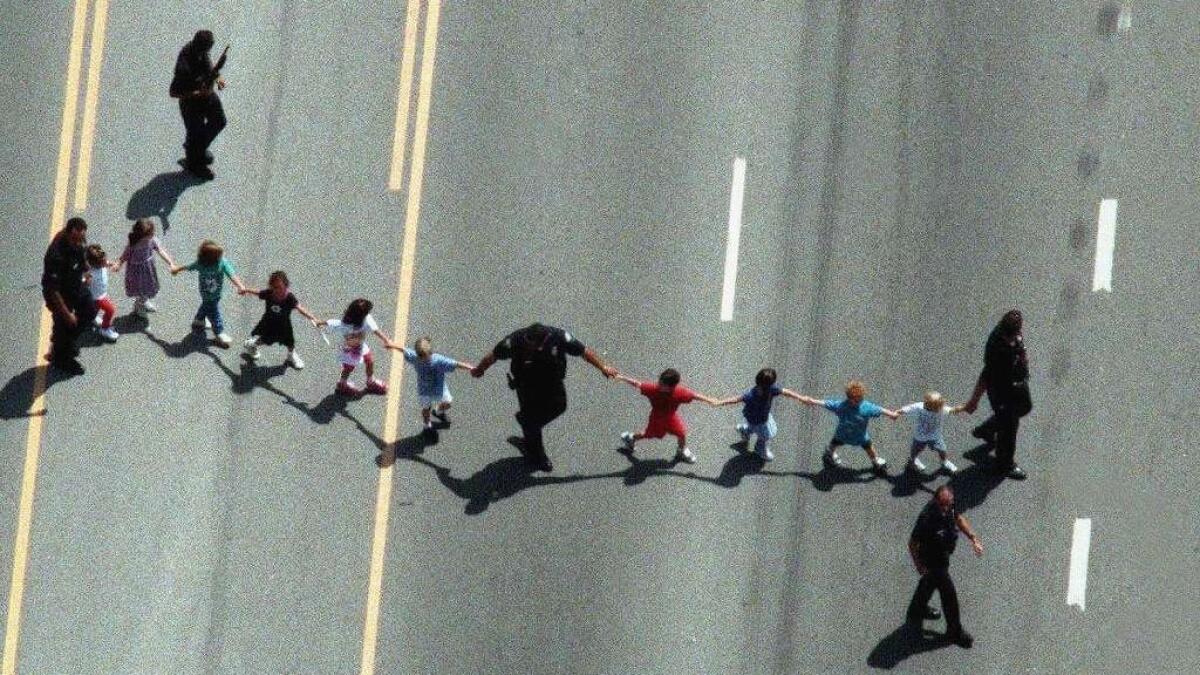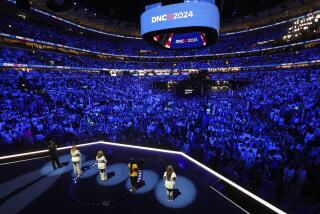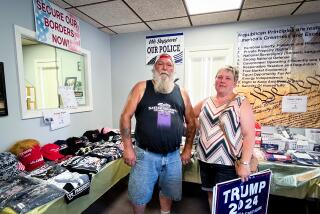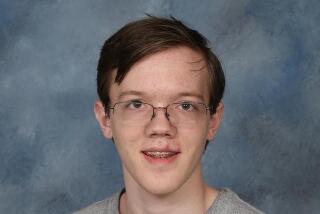Survivors of 1999 attack at Jewish Community Center in Granada Hills reflect on mass shooting in Pittsburgh

Loren Lieb and Donna Finkelstein were on their way to Lancaster on Saturday to campaign against a congressional candidate who opposes strict gun control laws when the two women received a call with news about a mass shooting in a Pittsburgh synagogue.
Eleven people were killed and six injured, in what is believed to be the deadliest attack on the Jewish community in U.S. history.
The two longtime friends were stunned. “When is something going to change?” Lieb wondered.
The women bonded nearly 20 years ago after another tragic incident in which a self-professed white supremacist walked into the North Valley Jewish Community Center armed with a semiautomatic weapon and began shooting. Lieb’s 6-year-old son and Finkelstein’s 16-year-old daughter were among the five people wounded.
Since then, Lieb and Finkelstein have become involved with the Brady Campaign to Prevent Gun Violence and are board members of Women Against Gun Violence.
“We have a special bond,” Finkelstein said. “We both took this tragic shooting and we became activists. We know that we do whatever we can to prevent future gun violence.”
The mothers had never met before the Aug. 10, 1999, shooting at the community center. Finkelstein’s daughter, Mindy, was a counselor and Lieb’s son, Josh Stepakoff, was attending summer day camp.
That morning, Josh had just finished a game of “capture the flag” and was walking down the main corridor of the community center when he came face-to-face with a person he thought was a construction worker. The man turned out to be the shooter, Buford Furrow Jr.
Of the five people wounded that day, three were children ages 5 and 6. After the rampage, Furrow left the center and fatally shot a mail carrier in Chatsworth. Furrow is currently serving a life sentence.
Although Josh was shot in the leg and the hip, he remembers only running. Mindy was with another camper when she was shot twice and managed to escape with the child.
On Saturday morning, Mindy Finkelstein was in bed with her 7-month-old daughter and her husband in the Bay Area when she received texts from family members asking if she’d heard about the Pittsburgh shooting. As she watched the news, she felt “an overwhelming sense of survivor’s guilt.”
“I also had a deeper sense of sadness that not much has changed in almost 20 years and actually, now more than ever, gun violence and hate are more prevalent than they were when I was shot,” she said. Now 35, Mindy criticized the easy accessibility to guns, as well as the sheer power of the weapons available.
Saturday’s shooting unfolded over 20 minutes at the Tree of Life Synagogue in Pittsburgh’s Squirrel Hill neighborhood, known locally for being the historical hub of the city’s Jewish community. The gunman, identified as Robert Bowers, 46, of Pittsburgh, was armed with an assault rifle and three handguns, officials said.
During negotiations for Bowers’ surrender, an officer at the scene radioed that Bowers was saying that “all these Jews need to die.” He was charged late Saturday on 29 counts, including 11 counts of murder with a firearm, and several hate crime charges such as obstructing the exercise of religious beliefs resulting in death.
The Anti-Defamation League reported earlier this year that “anti-Semitic incidents in the U.S. rose 57% in 2017 — the largest single-year increase on record and the second-highest number reported since ADL started tracking such data in 1979.”
Mindy’s daughter is growing up Jewish and she said she wants her “to be proud of that.”
“I don’t want her to shy away from it or hide it and I don’t want to hide it. I want to be proud of my heritage,” Mindy said. “The leaders of this country have a responsibility to make it known that this hate that is being spewed out everywhere is wrong and it’s actually killing people.”
President Trump, in his first comment to reporters on the shooting, called for armed guards at synagogues and implied that lax security by the synagogue was at least partially to blame for the high death toll.
“If they had protection inside, the results would have been far better,” he said. “If there was an armed guard inside the temple, they would have been able to stop him, maybe there would have been nobody killed, except for him, frankly.”
After the North Valley Jewish Community Center shooting, the center installed gates, a guard shack and an armed security guard who worked around the clock, all of which came at a huge financial cost to the organization, according to Nina Lieberman, who oversaw the community center at the time. A Los Angeles police officer kept watch at the site for weeks.
Lieberman’s 6-year-old son was enrolled in the summer camp and witnessed the shooting.
The community center saw a small dip in enrollment after the shooting, said Lieberman, who was associate executive director of the Jewish Community Centers of Greater Los Angeles at the time. It was a precursor to a bigger blow just a few years later when parents pulled their kids out of preschools and summer camps in large numbers after the 9/11 terrorist attacks out of fear of sending their children to Jewish centers.
The drop in revenue played a significant role in causing a financial crisis for the organization, Lieberman said. The Granada Hills site was shuttered in the early 2000s and the land was sold. Members of the community later joined other groups and formed the Valley Jewish Community Center in Woodland Hills.
Still, the tragedy in 1999 brought the greater community together, with preschool held the very next day at an Episcopal church next door, Lieberman said.
“We made a very conscious decision to act like a community center and provide a sense of belonging,” she said. “We took it as an opportunity to create a sense of togetherness, to say, ‘We are not going to fall because of your behavior.’”
After Donna Finkelstein’s husband called her Saturday with the news, she spent most of the day weeping. So did Lieb.
The women would spend several hours together canvassing neighborhoods in Lancaster. As they knocked on each door, Finkelstein was fearful about what could happen.
“Because you don’t know who has a gun,” Finkelstein said.
Twitter: @Brittny_Mejia
Twitter: @mayalau
More to Read
Sign up for Essential California
The most important California stories and recommendations in your inbox every morning.
You may occasionally receive promotional content from the Los Angeles Times.












